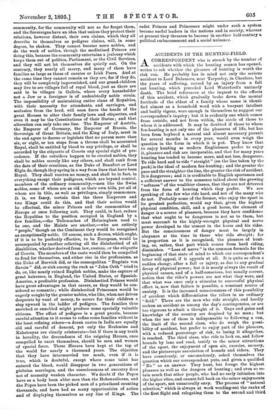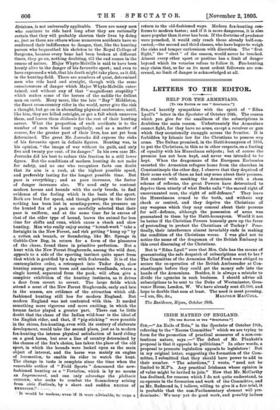ACCIDENTS IN THE HUNTING-FIELD.
ACORRESPONDENT who is struck by the number of accidents with which the hunting season has opened, writes to ask whether the pleasure of hunting is worth the risk run. He probably has in mind not only the serious accident to Lord Delamere, near Tarporley, in Cheshire, but the years of suffering, caused by an injury from a fall out hunting, which preceded Lord Waterford's untimely death. The brief references at the inquest to the effects of this accident, which gradually broke down the mental fortitude of the eldest of a family whose name is identi- fied almost as a household word with a buoyant intellect and bodily vigour, were enough in themselves to suggest our correspondent's inquiry; but it is evidently one which comes from outside, and not from within, the circle of those to whom it is addressed. It may be doubted if those to whom fox-hunting is not only one of the pleasures of life, but has been from boyhood a natural and almost necessary pursuit for several months in every year, would even weigh the question in the form in which it is put. They know that to enjoy hunting as modern Englishmen prefer to enjoy it, pleasure and risk are inseparable, and that for many years bunting has tended to become more, and not less, dangerous. To ride hard and to ride " straight" (on the line taken by the pack) is the ideal of modern fox-hunting; and the greater the pace and the straighter the line, the greater the risk of accident. It is dangerous; and it is creditable to English sportsmen and a sufficient answer to the nonsense talked about the growing " softness " of the wealthier classes, that they are not deterred from the form of hunting which they prefer. We are speaking of the few who ride hard, and not of the many who do not. Probably some of the former, who enjoy the sport in its greatest perfection, would say that, given the highest physical condition, skill, and a good horse, the element of danger is a source of pleasure, because they have confidence that what ought to be dangerous is not so to them, but must succumb to the highly-wrought physical and nerve power developed to the utmost in the horse and his rider. But the consciousness of danger must be largely in abeyance at the time in those who ride straight ; for in proportion as it is recognised, the pleasure of hunt- ing, or, rather, that part which comes from hard riding, diminishes. " Loss of nerve " is the common formula for the beginning of that state of mind to which our correspondent's letter will appeal, if it appeals at all. It is quite as often a sudden change, after a fall or injury, as due to any gradual decay of physical power; but it is nearly always the result of physical causes, and of a half-conscious, but usually correct, notion that the rider's powers are not what they were, and that what was once only a stimulus to successful physical effort is, now that failure is possible, a constant source of anxiety. It is the increased consciousness of this possibility of accident which differentiates the riders in an ordinary "field." There are the men who ride straight, and hardly reckon an accident as among the day's contingencies, or are too vigorous to admit a thought of it. Gaps and gates and knowledge of the country are despised by no man ; but when the use of these is indispensable to following a run, the limit of the second class, who do weigh the possi- bility of accident, but prefer to enjoy part of the pleasure, with a reduced percentage of risk, to losing it altogether, is reached. The third class, who ride to look on, and follow hounds by lane and road, testify to the minor attractions of the sport, the enjoyment of open air, exercise, scenery, and the picturesque association of hounds and riders. They have consciously, or unconsciously, asked themselves the question which our correspondent puts, and given a qualified " No " as an answer. They bunt, but forego the highest pleasure as well as the dangers of hunting ; and even so re- tain much that other people, who had no early initiation into the higher rites, and cannot fall back on the minor enjoyments of the sport, not unnaturally envy. The process of " natural selection," which is always at work weeding-out the ranks of the first flight and relegating them to the second and third divisions, is not universally applicable. There are many men who continue to ride hard long after they are rationally certain that they will probably shorten their lives by doing so, just as there are others whose numerous accidents have so confirmed their indifference to danger, that, like the hunting parson who bequeathed his skeleton to the Royal College of Surgeons, because every bone had been broken at different times, they go on, nothing doubting, till the end comes in the course of nature. Major Whyte-Melville is said to have been keenly alive to the danger of his favourite sport; and even to have expressed a wish, that his death might take place, as it did, in the hunting-field. There are numbers of quiet, determined men who ride bard and straight, though with the same consciousness of danger which Major Whyte-Melville enter- tained, and without any of that " magnificent stupidity " which makes some of the heroes of the saddle the dullest men on earth. Many more, like the late " Bay " Middleton, the finest cross-country rider in the world, never give the risk a thought, but go on in abounding physical exuberance, until, like him, they are killed outright, or get a fall which unnerves them, and leaves them declasses for the rest of their hunting career. What the proportion of such accidents is to the number of men who hunt regularly, and as a matter of course, for the greater part of their lives, has not yet been determined. The great Mr. Jorrocks did express the risks of his favourite sport in definite figures. Hunting was, in his opinion, " the image of war without its guilt, and only five and twenty per cent. of its danger." In his own case Mr. Jorrocks did his best to reduce this fraction to a still lower figure. But the conditions of modern hunting do not make for safety, and no one who recognises facts can doubt that its aim is a rush, at the highest possible speed, and preferably lasting for the longest possible time. But pace is everything ; and as pace increases, the factor of danger increases also. We need only to contrast modern horses and hounds with the early breeds, to find evidence of the feeling which is the basis of the sport. Both are bred for speed, and though perhaps in the latter nothing has been lost in scenting-power, the pressure on the hunted fox of a pack so carefully selected that their pace is uniform, and at the same time far in excess of that of the older type of hound, leaves the animal far less time for shifts and runs, which cause a check and slow hunting. Men who really enjoy seeing " hound-work " take a fortnight in the New Forest, and risk getting "hung up" by a rotten oak branch, or floundering, like Mr. Sponge in Gobble-Cow Bog, in return for a form of the pleasures of the chase, found there in primitive perfection. But a hunt with the New Forest Staghounds, among the wild deer, appeals to a side of the sporting instinct quite apart from that which is gratified by a day with foxhounds. It is of the contemplative order, a retrospect into Tudor days, slow bunting among great trees and ancient woodlands, where a single hound, separated from the pack, will often give a complete exhibition of the hunting instincts, as it drives a deer from covert to covert. The large fields which attend a meet of the New Forest Staghounds, early and late in the season, are evidence of the attraction which old- fashioned hunting still has for modern England. But modern England was not contented with this. It needed something more vigorous and more exciting, in which the human factor played a greater part, There can be little doubt that the chase of the Indian wild-boar is the ideal of the English rider, and that, if " pig-sticking " were possible in the shires, fox-hunting, even with its century of elaborate development, would take the second place, just as in modern fox-hunting the intense physical satisfaction of hard riding on a good horse, but over a line of country determined by the chance of the fox's choice, has taken the place of the old sport, in which the hounds were looked upon as the main object of interest, and the horse was mainly an engine of locomotion, to enable its rider to watch the hunt. The change in taste is complete since the time when the venerable author of " Field Sports " denounced the new- fashioned hunting as a " Variation, which is by no means an Improvement, and can only advantage the plethoric CITIZEN, who seeks to combat the Somnolency arising from civic Festivals, by a short and sudden EXCESS of xxxacISE."
It would be useless,- even if it were advisable, to urge a return to the old-fashioned ways. Modern fox-hunting con- forms to modern tastes ; and if it is more dangerous, it is also more popular than it ever has been. If the doctrine of prudence were preached, it would only reach those already half-con- verted,—the second and third classes, who have begun to weigh the risks and temper enthusiasm with discretion. The "first flight," the " elect " of the season, would never be touched. Almost every other sport or pastime has a limit of danger- beyond which its votaries refuse to follow it. Fox-hunting may claim that, so far as its most ardent followers are con- cerned, no limit of danger is acknowledged at all.



















































 Previous page
Previous page